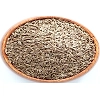Cumin
3.99
4.00
You Save: 0.0099999999999998. Discount: 0.25%
-
Product is not available
Country Of Origin : India
Product: Cumin Seeds
Description:
Cumin seeds are the dried seeds of the Cuminum cyminum plant, which belongs to the parsley family. They are widely used as a spice in various cuisines worldwide, known for their distinctive aroma, warm flavor, and culinary versatility. Cumin seeds are also valued for their medicinal properties and are used in traditional herbal remedies.
Specifications for Export:
- Purity: Cumin seeds should be clean and free from foreign matter, such as dirt, stones, stems, and other impurities. High purity ensures the quality and marketability of the product.
- Color: Cumin seeds should have a uniform brown color, indicating maturity and proper drying. Any discoloration or off-color seeds should be minimal.
- Aroma: Cumin seeds should have a strong, aromatic fragrance characteristic of fresh and high-quality spices. The aroma should be spicy, earthy, and slightly bitter.
- Flavor: Cumin seeds should have a bold, warm flavor with a slightly nutty and peppery undertone. The flavor should be intense and well-balanced, without any signs of staleness or rancidity.
- Oil Content: Cumin seeds should have a moderate oil content, which contributes to their aroma, flavor, and nutritional value. The oil content is typically around 4-5% but may vary depending on the variety and growing conditions.
- Moisture Content: Cumin seeds should have a low moisture content to prevent mold growth, deterioration, and insect infestation during storage and transit. The maximum moisture content is usually around 10%.
- Size: Cumin seeds come in different sizes, ranging from small to medium. Export-quality cumin seeds should have a uniform size, with minimal variation to ensure consistency in cooking and processing.
- Shape: Cumin seeds are elongated and oval-shaped with ridges. They should be well-formed and uniform in shape, without any deformities or irregularities.
- Foreign Matter: Cumin seeds should be free from foreign matter, such as chaff, husks, and broken seeds. Any extraneous matter should be minimal and within acceptable limits.
- Microbiological Standards: Cumin seeds should comply with microbiological safety standards, including limits for total bacterial count, yeast, molds, and pathogens such as Salmonella and E. coli. Regular testing and certification may be required to ensure compliance with food safety regulations.
- Packaging: Cumin seeds are typically packed in moisture-resistant packaging such as laminated pouches, polypropylene bags, or jute bags to maintain freshness and prevent moisture absorption. Packaging should be sturdy and sealable to prevent contamination and spoilage during transit.
- Origin: The origin of cumin seeds should be clearly labeled on packaging to ensure traceability and compliance with import regulations. Documentation verifying origin may be required for customs clearance.
- Shelf Life: Cumin seeds should have a sufficient shelf life to maintain quality and flavor during storage and transit. Proper packaging, storage conditions, and handling practices are essential for extending shelf life.



